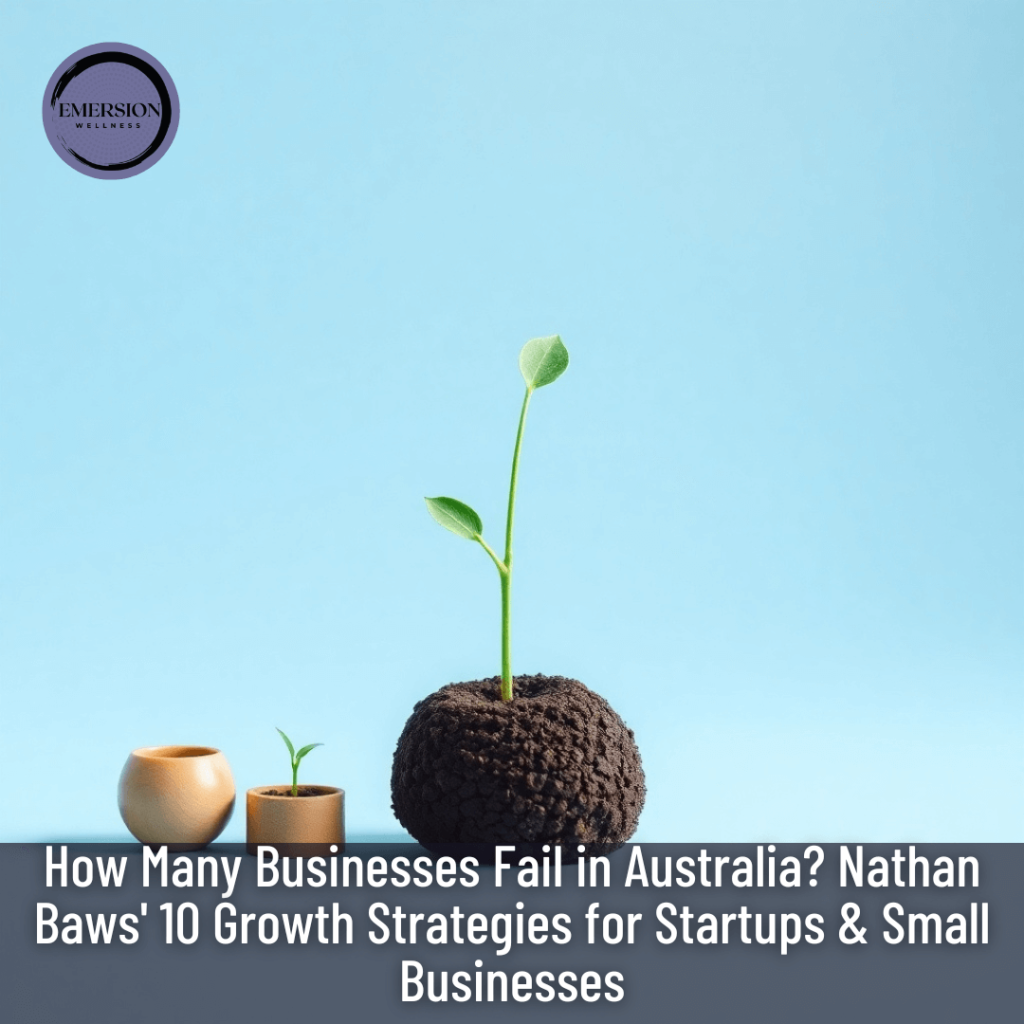Introduction
Hey there, you gutsy soul with a dream burning bright. I’m Nathan Baws, and I’ve walked the path you’re on—heart racing, hands full, turning nothing into something real. I’ve built health shops from the ground up and stood under the Shark Tank lights, nerves jangling but fire intact. Now, I’m here to help you keep your business from joining the grim stats.
How many businesses fail in Australia? Too many—about one in three tank in the first year, and half don’t see five, from what I’ve dug up. It’s a harsh truth, but it’s not here to knock you down. It’s a spark, a push to beat the odds. This isn’t some fluffy cheer session; it’s me spilling the unfiltered, offbeat strategies that carried me through and the wisdom I’ve passed to folks I’ve guided. We’re tackling how to keep your venture alive and kicking, not just another number. Let’s roll.
Key Takeaways
Here’s what’s on the table:
- Marketing tricks that spark buzz without draining your cash.
- Mindset shifts to ride the wild waves of this game.
- Practical ways to grow your business, even when funds are tight.
- Real tales from my grind—health shops, Shark Tank, and all.
- Steps you can jump on now to sidestep the failure trap.
Buckle up; we’ve got a lot to unpack.
Sparking Growth with Guerrilla Marketing
Zero-Cost Buzz That Hits
When I started my health shops, I had no budget for fancy ads—just a hunger to be seen. Forget the big spends; it’s about creativity that costs peanuts. I’d set up pop-up tastings in busy spots—parks, markets—handing out bites and chatting with anyone who’d stop. One time, we hit a local fair with a “guess the health ingredient” game, snacks as prizes. Folks talked for weeks, and it barely touched my pocket. How many businesses fail in Australia because they pour cash into marketing that flops? Too many. These low-cost stunts are your lifeline—get people buzzing about your venture.
Flipping Tough Times into Gold
I’ve hit rough patches—plenty. A health shop launch once went flat: no crowd, just echoes. Did I mope? Nope—I tore it apart, saw I’d timed it wrong, and turned it into a better go. For your business, every snag’s a chance. Lost a supplier? Find a local gem and spin it as a win. It’s about flipping the script. How many businesses fail in Australia because they can’t shift gears? A heap. This knack keeps your venture cooking through anything.
Building a Tribe, Not Just Sales
Your customers aren’t just wallets—they’re your crew. With my shops, I’d talk to regulars, ask what they craved, make them feel like kin. Do that—chat with your clients, hear their thoughts, thank them for sticking around. I’d host little health meetups, growing a tribe that spread the word. Maybe you throw a quick “taste our new dish” night. It’s loyalty, not just transactions. How many businesses fail in Australia chasing quick bucks over bonds? Community’s your venture’s heartbeat.
Stories That Stick
People don’t just buy stuff—they buy tales. My shops weren’t about stock; they were about better lives. What’s your “why”? Maybe it’s crafting joy or solving a need. Share that—on your site, face-to-face, everywhere. I’d tell folks why I started, and they’d stay. How many businesses fail in Australia with no soul to sell? Your story’s your hook—make it real.
The Grit to Keep Standing
Failure’s Your Teacher
I’ve flopped—big time. A shop opening that tanked still stings; I misread the crowd and ate it. But I didn’t pack it in—I learned, adjusted, came back tougher. Shark Tank was the same—every “no” sharpened me. For your venture, flops are part of it: a deal falls through, a plan misfires. Take it, study it, move on. How many businesses fail in Australia? Loads. But how many rise from the mess? That’s your edge.
Growing Through the Hustle
I’m sold on this: you can get better with effort—a growth mindset, they call it. It’s carried me through lean sales, Shark Tank stress. For your business, it’s about tackling the chaos—a rush order flops, so you tweak and nail it next time. Don’t stall; grow. How many businesses fail in Australia stuck in the mud? A venture that learns keeps breathing.
See the Win First
I’d shut my eyes and picture my shops full, my Shark Tank pitch landing. Visualization’s no soft trick—it’s fuel. For your business, see that big contract signed, goals smashed. It pumps you up, keeps you swinging. How many businesses fail in Australia blind? Picturing it keeps your venture on target.
Cut the Noise
Distractions? They’re brutal—phone buzzing, emails stacking up. I’ve lost days to them. For your business, lock in on the big stuff: new products, key clients. I’d ditch my phone pre-Shark Tank to focus. How many businesses fail in Australia scattered? A sharp venture cuts through the clutter.
Scaling Your Venture Lean
Bootstrapping Like a Champ
My health shops kicked off with nothing—no loans, just me scraping by. For your business, stretch every cent—rent gear, swap favors, plow profits back in. I’d trade with a printer once—saved cash, got flyers. How many businesses fail in Australia overspending? A lean venture stays afloat.
Partnerships That Lift
Don’t slog alone—team up. I linked with a gym to push my health goods; they got my folks, I got theirs. For your business, pair with someone who fits—cross-promote, share the load. It’s growth on the cheap. How many businesses fail in Australia solo? A partnered venture rises.
A Team That Rocks
Your crew’s your strength. I hired folks who loved my health mission—heart over hefty checks. For your business, grab people who get your vibe, treat them well. My early team stuck through tough days; yours can too. How many businesses fail in Australia with a shaky squad? A solid team wins.
Stick to What You Nail
Know your game—don’t overstretch. My shops rocked health snacks, so I handed off the rest. For your business, focus on your best—outsource the extras. How many businesses fail in Australia too broad? A tight venture shines.

Shark Tank Grit and Beyond
Prep for the Wild
Shark Tank was a storm—questions flying, pressure on. I learned quick: be ready for anything. For your business, know your numbers, your pitch—clients might throw curveballs too. How many businesses fail in Australia off-guard? A prepped venture stands firm.
Mentors Light the Way
I’ve leaned on pros who’ve been there—one shaped my Shark Tank pitch, saved me grief. For your business, find a vet who’s walked the walk—ask, soak it up. How many businesses fail in Australia lost? A mentor keeps your venture on track.
A Brand That Pops
In a packed field, stand out. My shops were health with heart—what’s your hook? Craft a vibe that sings. How many businesses fail in Australia fading in? A bold brand cuts through.
Bend, Don’t Snap
Things shift—adapt or sink. I’ve tweaked offerings when trends turned; you might too—new demand? Meet it. How many businesses fail in Australia stiff? An adaptable venture rolls on.
Nailing the Deal Game
Know Your Worth
I’ve stepped into deals clear on my shops’ value—same for your business. What’s your edge? Stand tall on it. How many businesses fail in Australia lowballing? A confident venture scores.
Ear On, Mouth Off
I’ve clinched deals by listening—less talk, more ears. For your business, hear what they need—tight budget? Adjust. How many businesses fail in Australia yapping? A listening venture seals it.
Win-Win Plays
I hate one-sided wins—both should grin. For your business, craft deals where all gain—like a steady gig for a fair rate. How many businesses fail in Australia grabbing quick? A win-win venture builds.
Ditch the Duds
I’ve walked from bad offers—Shark Tank drilled that in. For your business, if it’s off—say, a client stiffs you—bail. How many businesses fail in Australia stuck? A smart venture knows when to split.
The Future of Your Venture
Tech That Works
Tech’s shaking things up—I’ve used tools to track sales, save time. For your business, automate, push social. How many businesses fail in Australia lagging? A tech-smart venture leads.
Care That Connects
People want good—my shops gave back with health drives. For your business, go local, support a cause. How many businesses fail in Australia tone-deaf? A caring venture clicks.
Keep Learning
I’m always digging—new tricks, trends. For your business, study up—new niche? Master it. How many businesses fail in Australia stale? A learning venture grows.
Build to Last
This isn’t just now—it’s legacy. My shops aimed to change lives; your venture can too—leave a mark. How many businesses fail in Australia short-sighted? A legacy venture endures.
Conclusion
There’s my playbook—unconventional moves, grit, and real talk to keep your venture off the failure pile. How many businesses fail in Australia? Too many—but not yours, not if you grab this and run. We’ve hit marketing, mindset, scaling, Shark Tank lessons, negotiation, and what’s next. It’s a wild ride, but with these strategies, you can beat the stats. I’ve lived it—from health shops to TV lights—and I’m cheering you on.
Ready to crank your venture up? I’m Nathan Baws—hit at https://nathanbaws.com/ for consulting or a speaking gig. Let’s defy how many businesses fail in Australia together.
FAQs
Scaling Lean?
Bootstrap, team up, nail your crew, focus tight—stretch it all. How many businesses fail in Australia broke? A lean venture survives.
Mindset Shifts?
Own flops, grow through, see it, stay sharp—toughen up. How many businesses fail in Australia weak? A gritty venture stands.
Mentor Hunt?
Hit events, ask pros—someone’s been there. How many businesses fail in Australia lost? A guided venture finds its way.
Cheap Marketing?
Stunts, social, tales, ties—buzz on a dime. How many businesses fail in Australia unseen? A clever venture shines.
Fear of Flops?
See it as a lesson—I’ve fallen, risen. How many businesses fail in Australia scared? A bold venture pushes.
Solid Plan?
Sum it up, know your field, crunch numbers—map it clear. How many businesses fail in Australia blind? A planned venture rolls.
Team Vibes?
Hire heart, cheer them, grow them—strong ties. How many businesses fail in Australia split? A united venture wins.
Deal Tips?
Know your worth, hear them, win both ways—walk if off. How many businesses fail in Australia duped? A sharp venture deals.
Balance Life?
Set lines, hand off, take breaks—don’t fry. How many businesses fail in Australia burned? A balanced venture lasts.
Big Flubs?
No plan, blind to rivals, cash dry—watch it. How many businesses fail in Australia sloppy? A tight venture dodges.


